- Clone
- 5H10-27(MFR5) (See other available formats)
- Regulatory Status
- RUO
- Other Names
- α5 integrin, VLA-5 α chain, Integrin α5, Fnra, Itga5
- Isotype
- Rat IgG2a, κ
- Ave. Rating
- Submit a Review
- Product Citations
- publications
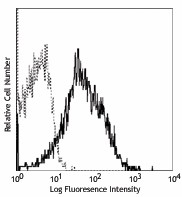
-

C57BL/6 mouse bone marrow cells stained with 5H10-27 PE
| Cat # | Size | Price | Quantity Check Availability | Save | ||
|---|---|---|---|---|---|---|
| 103805 | 50 µg | 104€ | ||||
CD49e is a 135 kD protein, also known as α5 integrin or VLA-5 α chain. It is a member of the integrin family, expressed on thymocytes, splenic B cells, activated T cells, and mast cells. CD49e associates with CD29 (integrin β1 chain) to form the fibronectin receptor (VLA-5). CD49e plays a critical role in both adhesion and T cell costimulation. The primary ligand for CD49e/CD29 (VLA-5) is fibronectin. The 5H10-27(MFR5) antibody has been shown to block CD49e mediated interactions and promote the in vitro stimulation of CD8+ T cells.
Product DetailsProduct Details
- Verified Reactivity
- Mouse
- Antibody Type
- Monoclonal
- Host Species
- Rat
- Immunogen
- (C57BL/6 x A/J)F1 mouse mast cell line
- Formulation
- Phosphate-buffered solution, pH 7.2, containing 0.09% sodium azide.
- Preparation
- The antibody was purified by affinity chromatography, and conjugated with PE under optimal conditions.
- Concentration
- 0.2 mg/ml
- Storage & Handling
- The antibody solution should be stored undiluted between 2°C and 8°C, and protected from prolonged exposure to light. Do not freeze.
- Application
-
FC - Quality tested
- Recommended Usage
-
Each lot of this antibody is quality control tested by immunofluorescent staining with flow cytometric analysis. For flow cytometric staining, the suggested use of this reagent is ≤ 0.25 µg per 106 cells in 100 µl volume. It is recommended that the reagent be titrated for optimal performance for each application.
- Excitation Laser
-
Blue Laser (488 nm)
Green Laser (532 nm)/Yellow-Green Laser (561 nm)
- Application Notes
-
Additional reported applications (for the relevant formats) include: immunohistochemical staining6,7 of acetone-fixed frozen sections, blocking of cell-cell adhesion1-5, inhibition of TNF-ß1 costimulated T cell proliferation3, and costimulation of T cell proliferation by cross-linked 5H10-27 antibody3. The Ultra-LEAF™ purified antibody (Endotoxin <0.01 EU/µg, Azide-Free, 0.2 µm filtered) is recommended for functional assays (Cat. No. 103817 and 103818).
- Application References
-
- Kinashi T, et al. 1994. Blood Cells 20:25. (Block)
- Halvorson MJ, et al. 1995. J. Immunol. 155:4567. (Block)
- Rich S, et al. 1996. J. Immunol. 157:2916. (Block Costim))
- Uhlenkott CE, et al. 1996. Clin. Exp. Metastasis 14:125. (Block)
- Schultz JF, et al. 1995. J. Biol. Chem. 270:11522. (Block)
- Yang JT, et al. 1996. Mol. Biol. Cell. 7:1737. (IHC)
- Cuklerman E, et al. 2001. Science 294:1708. (IHC)
- Jia W, et al. 2005. Blood 106:3854. (FC)
- Product Citations
-
- RRID
-
AB_313054 (BioLegend Cat. No. 103805)
Antigen Details
- Structure
- Integrin family, associates with integrin β1, 135 kD
- Distribution
-
Thymocytes, activated T cells, mast cells
- Function
- Adhesion, costimulation
- Ligand/Receptor
- Fibronectin
- Cell Type
- Mast cells, Mesenchymal Stem Cells, T cells, Thymocytes, Tregs
- Biology Area
- Cell Adhesion, Cell Biology, Immunology, Innate Immunity, Stem Cells
- Molecular Family
- Adhesion Molecules, CD Molecules
- Antigen References
-
1. Barclay AN, et al. 1997. The Leukocyte Antigen FactsBook Academic Press.
2. Kinashi T, et al. 1994 Blood Cells 20:25.
3. Hemler ME. 1990. Annu. Rev. Immunol. 8:365. - Gene ID
- 16402 View all products for this Gene ID
- UniProt
- View information about CD49e on UniProt.org
Related FAQs
- What type of PE do you use in your conjugates?
- We use R-PE in our conjugates.
Other Formats
View All CD49e Reagents Request Custom Conjugation| Description | Clone | Applications |
|---|---|---|
| PE anti-mouse CD49e | 5H10-27(MFR5) | FC |
| Purified anti-mouse CD49e | 5H10-27(MFR5) | FC,IHC-F |
| Alexa Fluor® 488 anti-mouse CD49e | 5H10-27(MFR5) | FC |
| Alexa Fluor® 647 anti-mouse CD49e | 5H10-27(MFR5) | FC |
| PE/Cyanine7 anti-mouse CD49e | 5H10-27(MFR5) | FC |
| APC anti-mouse CD49e | 5H10-27(MFR5) | FC |
| Ultra-LEAF™ Purified anti-mouse CD49e | 5H10-27(MFR5) | FC |
Customers Also Purchased

Compare Data Across All Formats
This data display is provided for general comparisons between formats.
Your actual data may vary due to variations in samples, target cells, instruments and their settings, staining conditions, and other factors.
If you need assistance with selecting the best format contact our expert technical support team.
-
PE anti-mouse CD49e
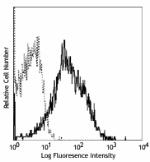
C57BL/6 mouse bone marrow cells stained with 5H10-27 PE -
Purified anti-mouse CD49e
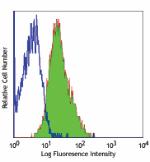
C57BL/6 mouse bone marrow stained with purified 5H10-27, fol... -
Alexa Fluor® 488 anti-mouse CD49e
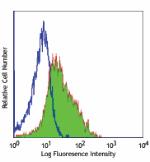
Balb/c mouse bone marrow stained with 5H10-27 Alexa Fluor® 4... -
Alexa Fluor® 647 anti-mouse CD49e
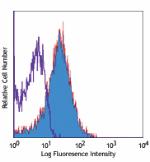
Balb/c mouse bone marrow stained with 5H10-27 Alexa Fluor® 6... -
PE/Cyanine7 anti-mouse CD49e
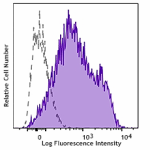
C57BL/6 mouse bone marrow cells were stained with CD49e (clo... -
APC anti-mouse CD49e
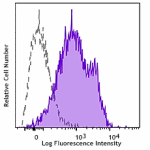
C57BL/6 mouse bone marrow cells were stained with CD49e (clo... -
Ultra-LEAF™ Purified anti-mouse CD49e

 Login / Register
Login / Register 













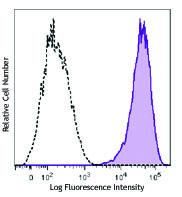



Follow Us